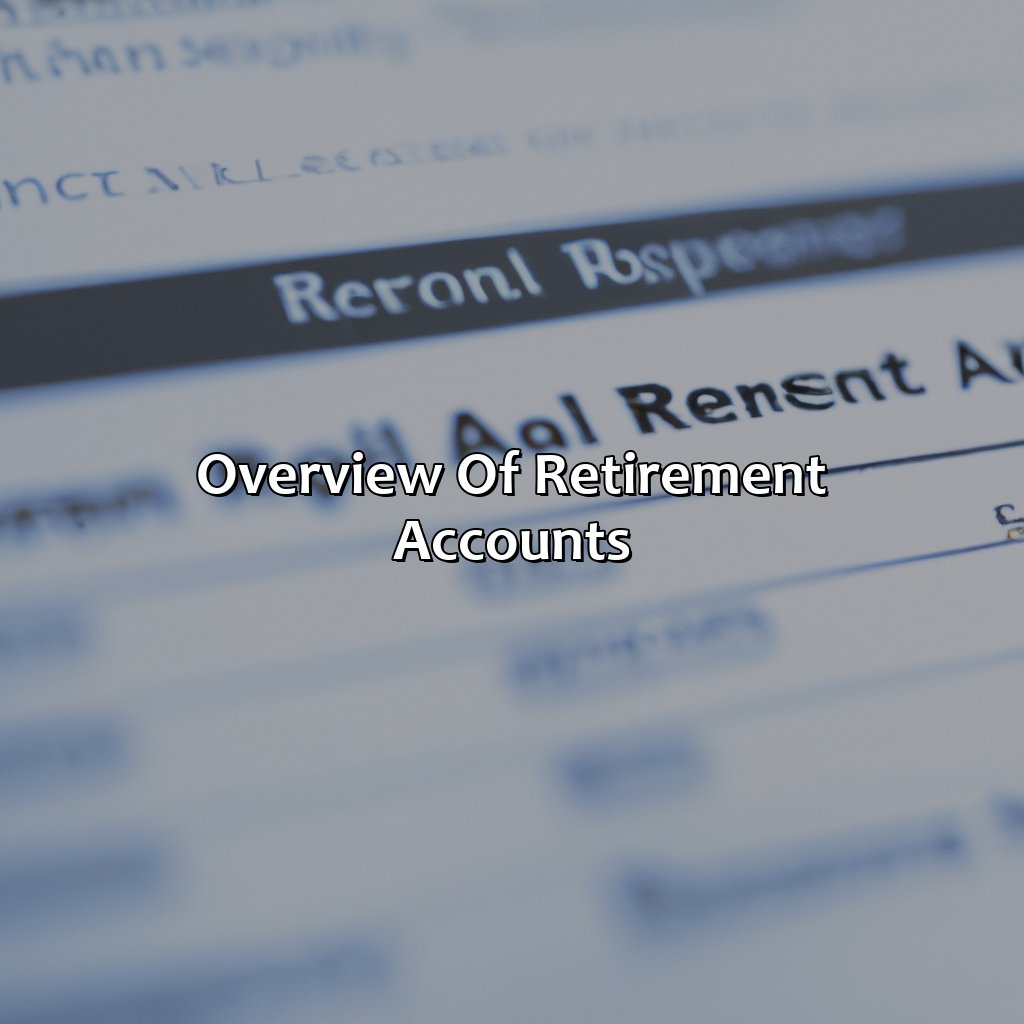What Retirement Account Is Best For Me?
Key Takeaway:
- Choosing the best retirement account depends on various factors, including your age, income, tax bracket, employer benefits, investment options, and withdrawal rules. Consider these factors before making a decision.
- For those in a lower tax bracket, a Roth IRA may be the best option as contributions are made with after-tax dollars, resulting in tax-free withdrawals in retirement. However, those in a higher tax bracket may benefit more from a Traditional IRA or 401(k).
- If you are self-employed or a small business owner, options such as the Solo 401(k) or Simplified Employee Pension (SEP) IRA may be worth considering. These options can offer higher contribution limits than traditional accounts.
Are you wondering which retirement account is the best choice for you? You’re not alone! This article will help you compare the features and benefits of various retirement accounts, empowering you to make an informed decision.
Overview of Retirement Accounts
Retirement Accounts: A Detailed Guide
Retirement planning requires a careful selection of the best retirement account that suits your needs. Every individual has varying financial goals and will need a retirement account that caters to their objectives.
The most common types of retirement accounts include:
- a 401(k)
- an IRA
- a Roth IRA
- and a SEP IRA
A 401(k) is the most popular account, while an IRA can be self-managed or managed through a financial institution. A Roth IRA has the benefit of tax-free withdrawals, whereas regular IRA withdrawals are taxed. Finally, a SEP IRA is most suitable for small business owners or self-employed individuals.
Moreover, it is vital to keep track of investment fees and rates of return associated with each type of account. This includes administrative and management fees, which can significantly reduce overall returns on your investment.
It is crucial to choose a retirement account that aligns with future expectations, income, and estimated expenses. Savvy investors should continually analyze their account and make the necessary adjustments according to their strategy or life-changing circumstances.
Secure your future today by researching, analyzing, and choosing the best retirement account that suits your goals. Delaying retirement planning can lead to missed opportunities and a lower standard of living. Invest in your future to relish a comfortable retirement!

Image credits: retiregenz.com by David Jones
Types of Retirement Accounts
Retirement Account Options: A Professional Overview
Various retirement account options exist to help you save for your golden years. Here is a breakdown of each type to help you choose the best account for your needs:
| Retirement Account Type | Key Features |
|---|---|
| Traditional IRA | Tax deductible contribution or deduction when filing taxes; ordinary income tax applies to withdrawals |
| Roth IRA | Contributions are not tax deductible, but withdrawals in retirement are tax-free; no required minimum distributions (RMDs) at age 72 |
| 401(k) plan | Contributions are tax-deductible; withdrawals in retirement are taxed as ordinary income |
| 403(b) plan | Similar to 401(k) plans but available only to certain nonprofit employees |
| 457(b) plan | Available to some government employees and other eligible workers; similar to 401(k) |
Consider each option carefully to determine which retirement account is most suitable for your specific financial situation.
Fun Fact: Did you know that the traditional IRA was introduced as part of the Employee Retirement Income Security Act (ERISA) in 1974?

Image credits: retiregenz.com by Joel Jones
Factors to Consider in Choosing the Best Retirement Account
Factors to Consider when Selecting the Best Retirement Plan
Identifying the most suitable retirement plan is a crucial decision all employees and self-employed individuals face. This article outlines some significant factors to consider when selecting a retirement plan.
- Plan Eligibility and Availability: Determine whether you are eligible for a retirement plan, and if the plans offered by your employer align with your investment objectives.
- Contribution Limits: Research on the maximum amount of contributions allowed by each retirement plan. The IRS sets contribution limits yearly.
- Tax Benefits: Retirement plans have different tax treatments. Ensure you understand how each plan type impacts your tax returns.
- Investment Options: Different retirement plans offer various investment choices. Evaluate plan options on the level of risk, investment fees, and asset allocation.
It is essential to note that most retirement plans offer loan provisions, early withdrawal penalties, and vesting schedules that affect the overall value of the account. Perform a thorough analysis of each plan’s terms and conditions to make informed decisions.
Each retirement plan type has its advantages and disadvantages. Therefore, it is advisable to seek a professional financial advisor’s assistance when selecting the best plan for you.
In summary, selecting the right retirement plan requires careful consideration of plan eligibility, contribution limits, tax benefits, and investment options. Seek guidance from a financial professional, and evaluate the intricacies of each plan before making a final decision.

Image credits: retiregenz.com by Yuval Washington
Five Facts About Which Retirement Account Is Best For Me:
401(k) plans are the most popular employer-sponsored retirement plans in the United States, offering tax-deferred savings and often employer matching contributions. (Source: Investopedia)
Traditional IRA contributions are tax deductible, but withdrawals in retirement are taxed as income. (Source: NerdWallet)
Roth IRA contributions are made with after-tax dollars, but qualified withdrawals in retirement are tax-free. (Source: CNN Money)
SEP-IRA and Solo 401(k) plans are designed for self-employed individuals and small business owners. (Source: Forbes)
It is important to consider factors such as your income, age, and retirement goals when choosing a retirement account. (Source: U.S. News & World Report)
FAQs about What Retirement Account Is Best For Me?
What retirement account is best for me?
Choosing the right retirement account can be overwhelming. Here are some frequently asked questions to help you decide which one is best for you.
1. What are the different types of retirement accounts available?
There are several types of retirement accounts available including Traditional IRA, Roth IRA, 401(k), SEP IRA, Simple IRA, and Keogh plans. Each account has different rules regarding contributions, withdrawals, and tax benefits. It’s important to research each option before deciding which one is best for you.
2. Should I choose a Traditional IRA or a Roth IRA?
This depends on your tax situation. With a Traditional IRA, contributions are tax-deductible and taxed upon withdrawal during retirement. With a Roth IRA, contributions are made with after-tax dollars and withdrawals are tax-free during retirement. If you expect to be in a higher tax bracket during retirement, a Roth IRA may be the better choice.
3. What is a 401(k) plan and should I contribute to mine?
A 401(k) is an employer-sponsored retirement account. Contributions are made pre-tax and growth is tax-deferred until withdrawal during retirement. Many employers offer matching contributions, making a 401(k) a great way to maximize your retirement savings. You should always contribute at least enough to take advantage of any employer matching program.
4. Can I have multiple retirement accounts?
Yes, you can have multiple retirement accounts. In fact, many financial advisors recommend diversifying your retirement savings among multiple accounts for added security and flexibility.
5. Can I withdraw money from my retirement account before retirement?
Withdrawing money from a retirement account before retirement usually incurs penalties and taxes. However, there are some exceptions, such as hardship withdrawals or loans from certain accounts. It’s important to research the specific rules regarding early withdrawals for each type of retirement account.
6. How much should I contribute to my retirement account?
Financial experts recommend contributing at least 10-15% of your income to a retirement account. However, the exact amount you should contribute depends on your individual financial situation and retirement goals. It’s best to consult with a financial advisor to determine the optimal contribution amount for your needs.
 Checkout this IRS Loophole
Checkout this IRS Loophole 





